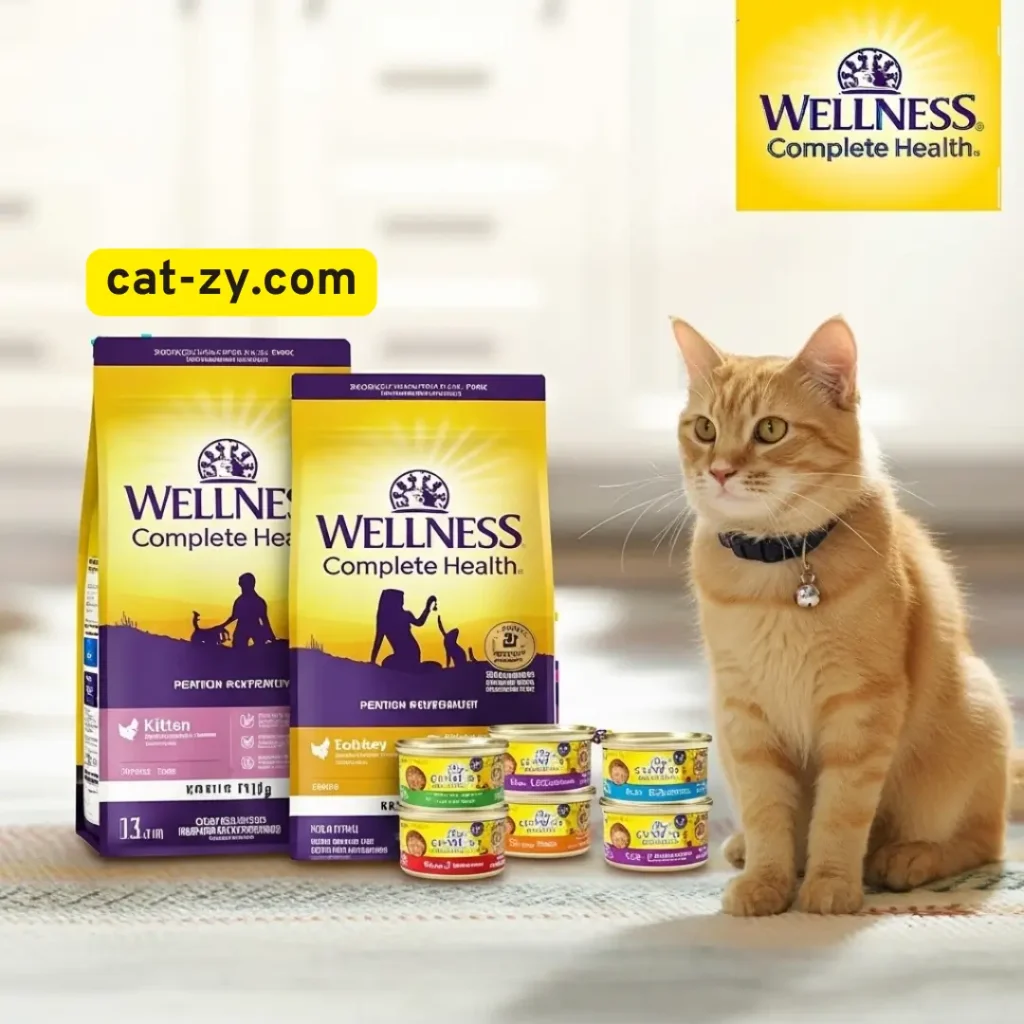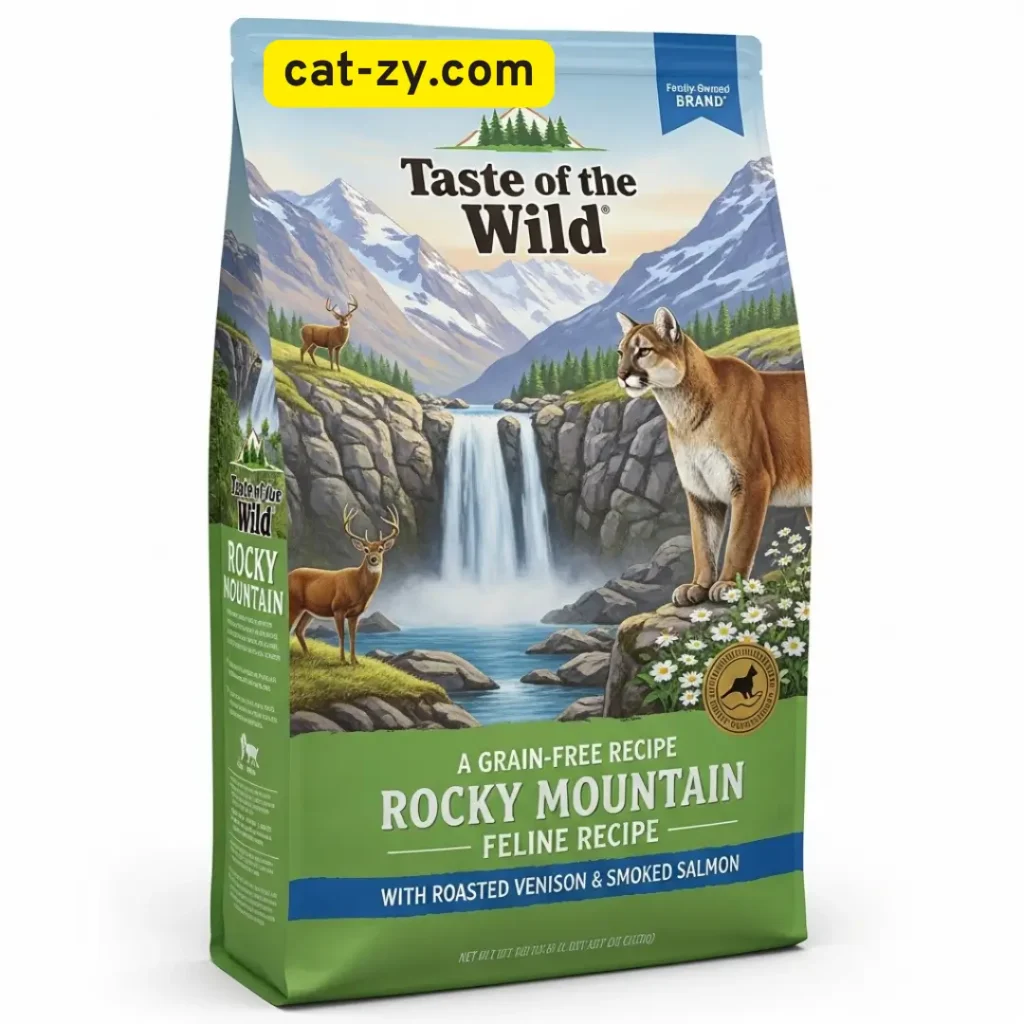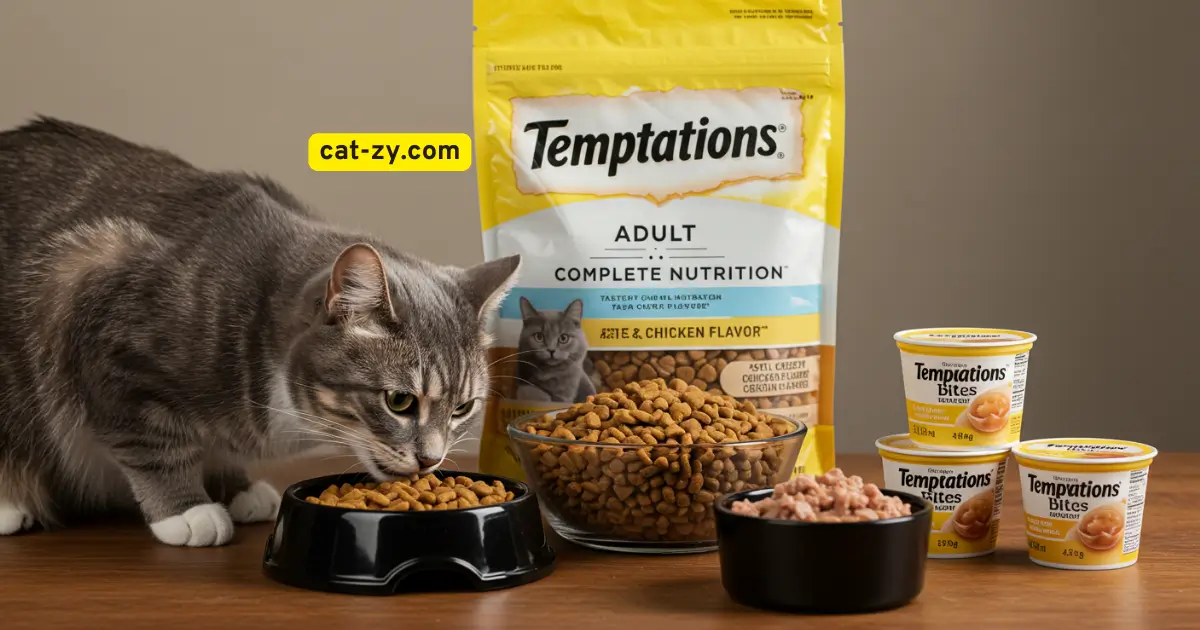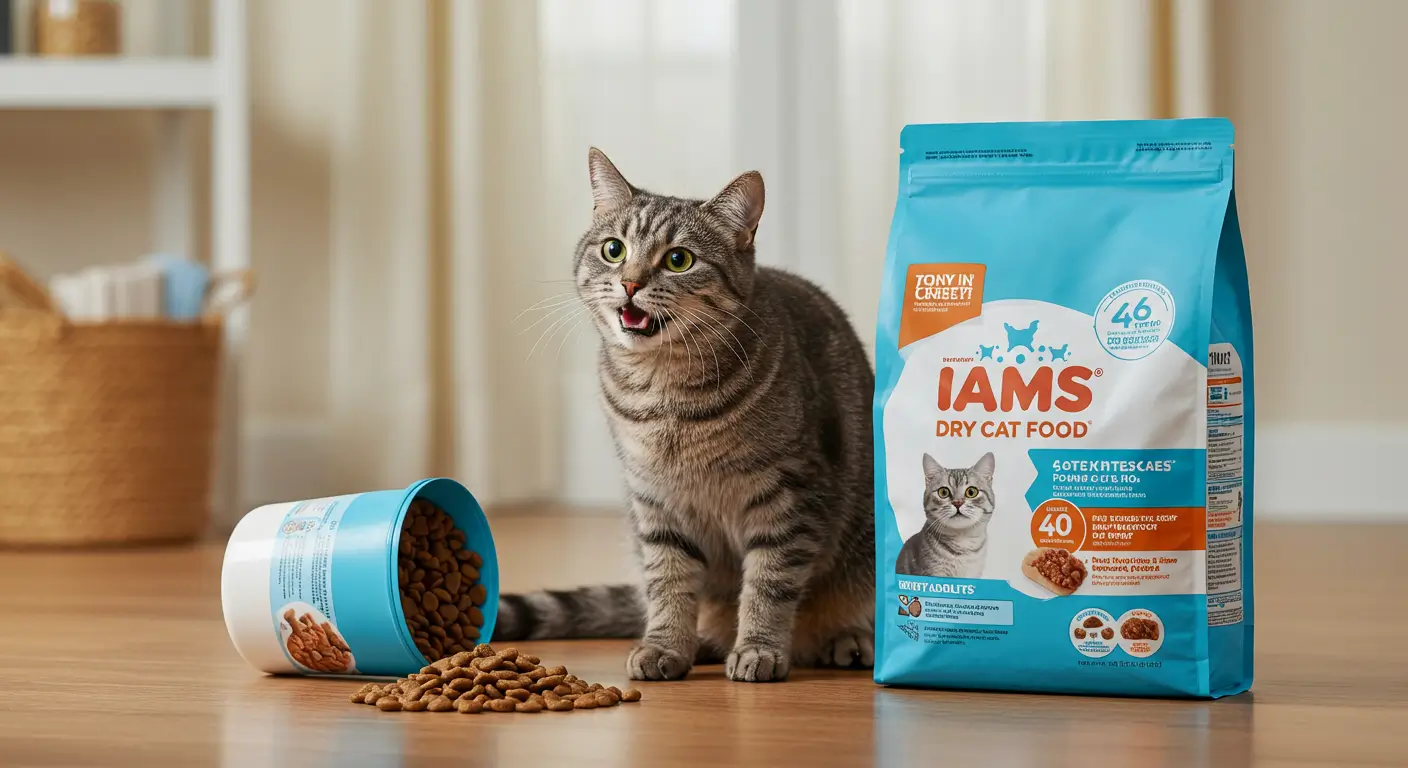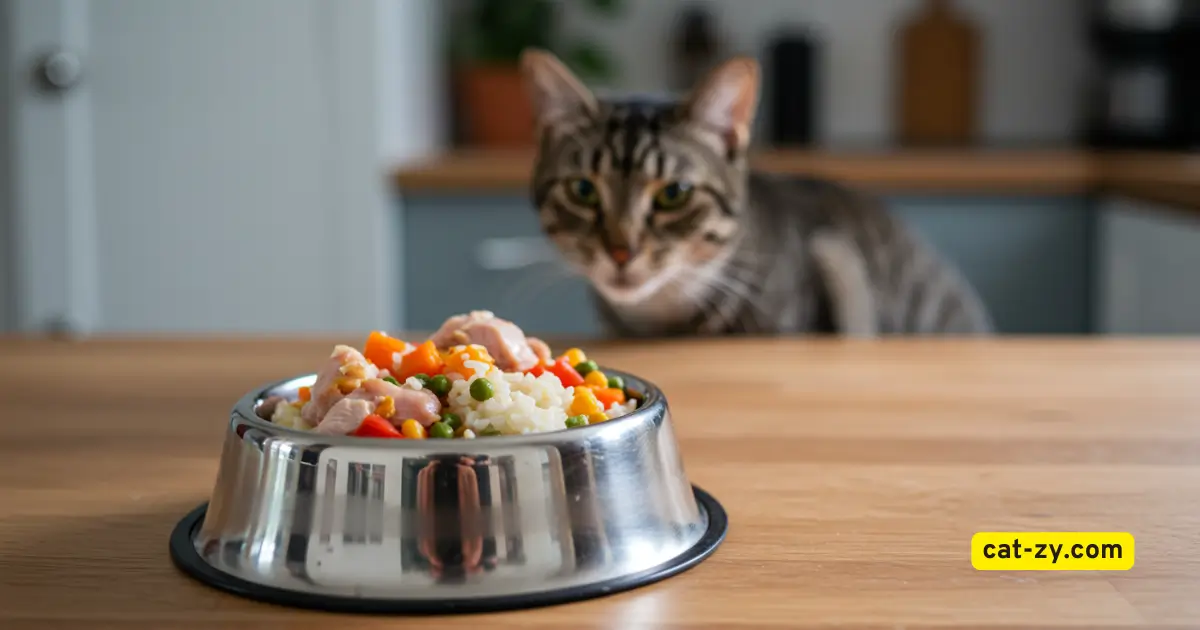Can Cats Eat Mango? 5 Surprising Facts You Must Know
As a cat owner wondering ‘Can cats eat mango,’ you’ve probably seen your cat watching you eat a mango. You might wonder, is it safe to share this tropical fruit with your pet?
Whether cats can have mango is not a simple yes or no. Mangoes are good for humans but might not be for cats. It depends on several factors.
Understanding what’s safe for your cat to eat is key to their health. In this article, we’ll look at five surprising facts about cats and mangoes. This will help you decide what’s best for your pet’s diet.
Table of Contents
The Curious Case of Cats and Fruit: An Overview
Cats are meat-eaters, but can cats eat mango and other fruits? Knowing what your cat needs to eat is key to their health.
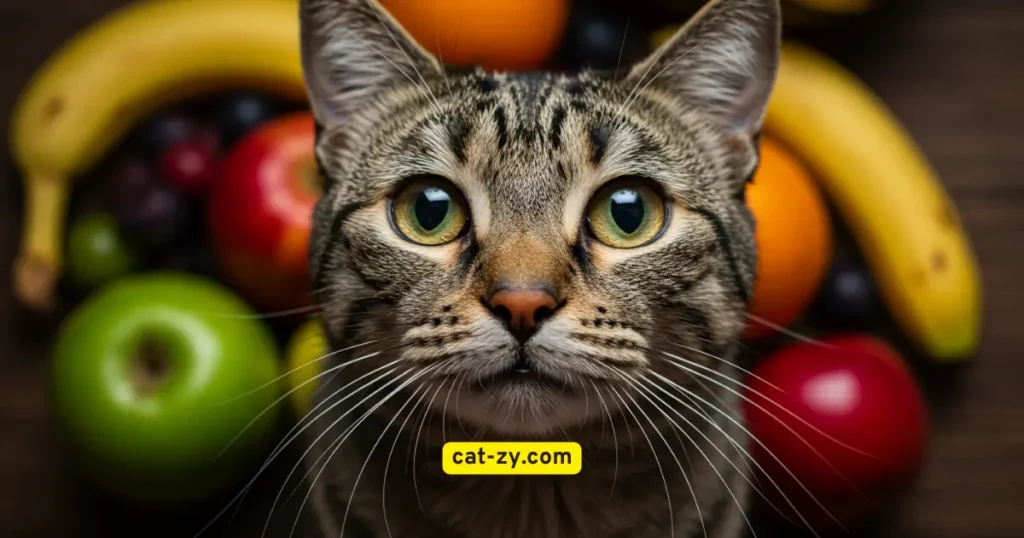
Understanding Feline Dietary Needs
Cats need a diet rich in animal proteins. This is essential for their health and nature.
Obligate Carnivores: What This Means
Cats must eat a lot of meat because their bodies are made for it. Their digestive system works best with beef. They need animal-based foods for their health.
Essential Nutrients for Cats
Cats require essential nutrients such as taurine, vitamin A, and arachidonic acid. These are found in animal products. They keep cats healthy, including their heart, vision, and skin.
Why Cats and Fruits Don’t Usually Mix
Fruits are not part of a cat’s usual diet. There are good reasons for this. Knowing why helps us understand why cats might not like mangoes.
Digestive System Limitations
Cats have a short digestive tract made for meat. They don’t have the right enzymes for plant digestion.
Taste Preferences in Felines
Cats can’t taste sweetness like humans do. They prefer the taste of amino acids in meat. This is why they’re not drawn to fruits like mangoes.
Can Cats Eat Mango? The Simple Answer
As a cat owner, you might wonder ‘Can cats eat mango safely’ when sharing this fruit with your feline friend.. The straightforward answer is that mangoes are non-toxic to cats. But it doesn’t mean they should be a regular part of your cat’s diet.
The Safety Profile of Mangoes for Cats
Mangoes are nutritious for humans, but have aspects important for cat owners to know. It’s key to understand the difference between a food being non-toxic and recommended.
Non-Toxic vs. Recommended Foods
Even though mangoes are non-toxic, they’re not ideal for cats. Cats need a diet that meets their specific nutritional needs. Their main food should be cat food, not human food.
Moderation Guidelines
If you give your cat mango, do it in moderation. Mango can be a treat, but it shouldn’t replace their regular, balanced diet.
What Veterinarians Say About Cats and Mangoes
Veterinarians offer insights on cats eating mangoes, based on expert opinions and research.
Expert Opinions on Fruit Consumption
Many veterinarians answer ‘can cats eat mango’ with yes, but it’s not necessary. Cats are obligate carnivores. They need a diet rich in protein from animal sources.
Research on Feline Fruit Digestion
Research on ‘can cats eat mango safely’ and digest fruits like mangoes is ongoing. But it’s known that cats lack enzymes to process fruit sugars well. So, fruits are more of a treat than a dietary staple.
5 Surprising Facts About Cats and Mangoes
Exploring the world of cats and mangoes reveals some interesting facts. Cats are meat-eaters, but they can be curious about fruits like mangoes. Here are five surprising facts about their unique relationship.
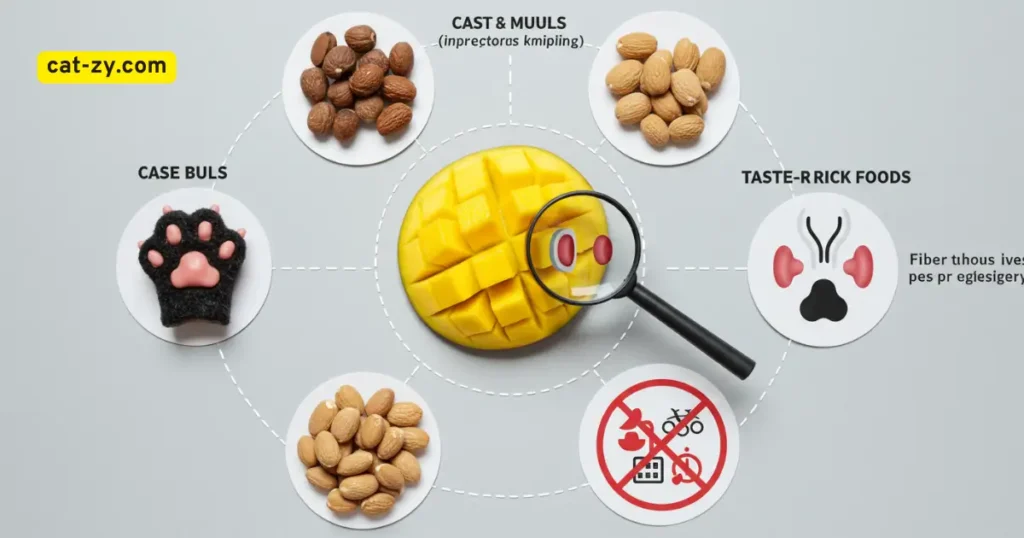
Cats Lack Sweet Taste Receptors
Cats see the world differently when it comes to taste. They can’t taste sweetness like humans do. This affects how they enjoy mangoes.
The Science Behind Feline Taste Buds
Feline taste buds are made to detect amino acids, not sugars. Their diet is mostly meat. So, mangoes taste different to them.
Mango’s Nutritional Profile for Cats
Mangoes have vitamins and minerals that can be good for cats in some ways.
Vitamins That Benefit Cats
Vitamins A and C in mangoes can help cats’ vision and immune system. But cats need these vitamins in animal-based forms.
The Fiber Factor in Mangoes
Mangoes have a lot of dietary fiber. This can affect cats in different ways.
How Fiber Affects Feline Digestion
Fiber can help cats’ digestion, but too much can upset their stomach. Cats can’t digest fiber as well as some other animals.
Mango Allergies in Cats
Cats can be allergic to foods like mangoes, just like humans.
Identifying Allergic Reactions
Symptoms of mango allergy in cats include itching, skin rashes, and stomach problems. In severe cases, it can cause anaphylaxis. If you think your cat is allergic, see a vet.
How Cats Process Fruit Sugars
Cats metabolize sugars differently from humans and other animals.
Metabolic Differences Between Cats and Humans
Cats can’t break down fructose, a sugar in mangoes, well. Eating too much fruit can lead to metabolic problems.
The Nutritional Breakdown of Mangoes
Mangoes have a mix of vitamins, minerals, and sugars. This mix can affect your cat’s health. They are rich in nutrients good for cats.
Vitamins and Minerals in Mangoes
Mangoes are packed with important vitamins and minerals. They have vitamins A, C, and B6. These vitamins are key to your cat’s health.
Vitamin A, C, and B6 Content
Vitamin A is good for your cat’s eyes, immune system, and skin. Vitamin C helps fight off infections. Vitamin B6 helps with energy.
Potassium and Other Minerals
Mangoes also have potassium, which is great for blood pressure and muscles. Other minerals in mangoes help your cat stay healthy.
Sugar Content and Concerns
Mangoes have a lot of sugar, which is a worry. Cats need different foods from humans. Too much sugar is bad for them.
Natural Sugars vs. Added Sugars
Mangoes have natural sugars, which are better than added sugars. But it’s key to watch how much mango your cat eats.
Caloric Density Considerations
Mangoes have a lot of calories because of their sugar. Eating too much mango can make your cat gain weight and have health problems.
Potential Benefits of Mango for Cats
Cats are meat-eaters, but some fruits, like mango, can be good for them. Mangoes have lots of nutrients and water. They can be a tasty treat for your cat sometimes.
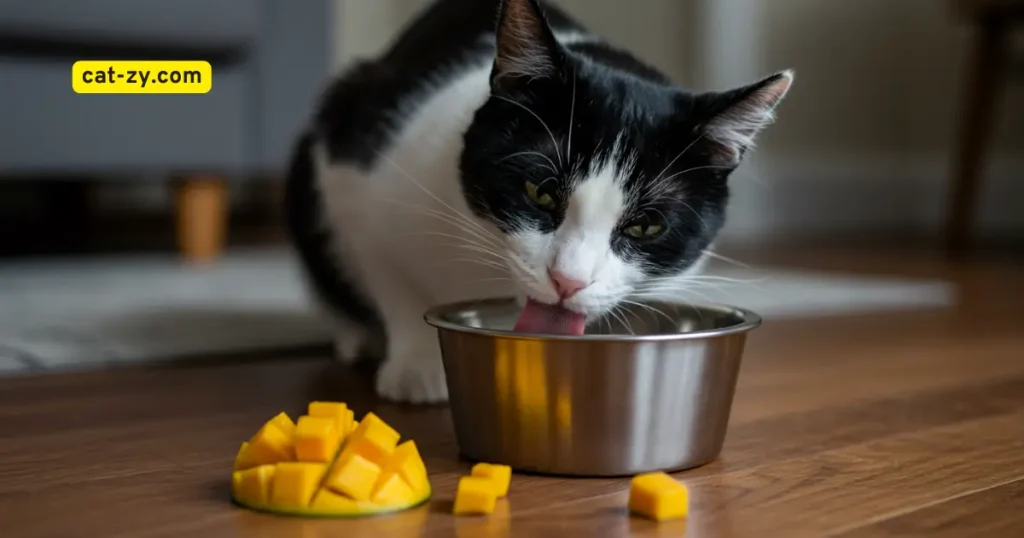
Hydration Benefits
Cats don’t always drink enough water. It’s important to give them foods that are full of moisture.
Water Content in Fresh Mango
Fresh mango is mostly water, about 83%. It’s a juicy treat that helps keep your cat hydrated. Mangoes are great for cats who don’t like to drink water.
Combating Feline Dehydration
Dehydration in cats is very serious. Giving your cat a little fresh mango can help keep them hydrated. This is good during hot weather or for cats with urinary problems.
Vitamin A and Cat Health
Mangoes are full of Vitamin A, which is good for cats.
Vision and Immune System Support
Vitamin A helps your cat’s eyes and immune system. It helps fight off infections and keeps your cat healthy.
Skin and Coat Health
Vitamin A also makes your cat’s skin and coat healthy. It helps keep their coat shiny and prevents skin problems.
Risks and Dangers: When Mangoes Become Problematic
Mangoes can be good for cats, but there are risks. As a cat owner, knowing these dangers is key to keeping your pet safe.
Sugar Content and Feline Diabetes
Mangoes have a lot of sugar, which is bad for cats. Eating too much sugar can lead to diabetes in cats. This is a serious condition that needs careful management.
Long-term Risks of Sugar Consumption
Long-term, sugar can cause more than diabetes in cats. It can also lead to obesity and other metabolic problems. It’s important to limit sugary foods, like mango, to avoid these issues.
Digestive Issues and Diarrhea
Cats have sensitive stomachs. Mango can upset their digestion, causing diarrhea. This is because mangoes have a lot of fiber and sugar.
Common Gastrointestinal Responses
When cats eat mango, they might vomit, have diarrhea, or feel pain in their belly. If your cat shows these signs, see a vet.
The Dangers of Mango Skin and Pit
The biggest risks of cats eating mango are the skin and pit. These can cause choking and blockages in the intestines.
Choking Hazards
The mango pit is a big choking risk for cats. If your cat eats a mango pit, watch them closely for any signs of trouble.
Toxic Compounds in Pits
Mango pits have toxic compounds that can harm cats. While the exact danger varies, it’s best to keep your cat away from mango pits.
Can Cats Eat Mango Skin? Important Safety Concerns
Mango skin might look harmless, but it’s not safe for your cat. Mangoes themselves are not toxic, but the skin can be a problem. It’s tough, might have pesticides, and can cause allergies.
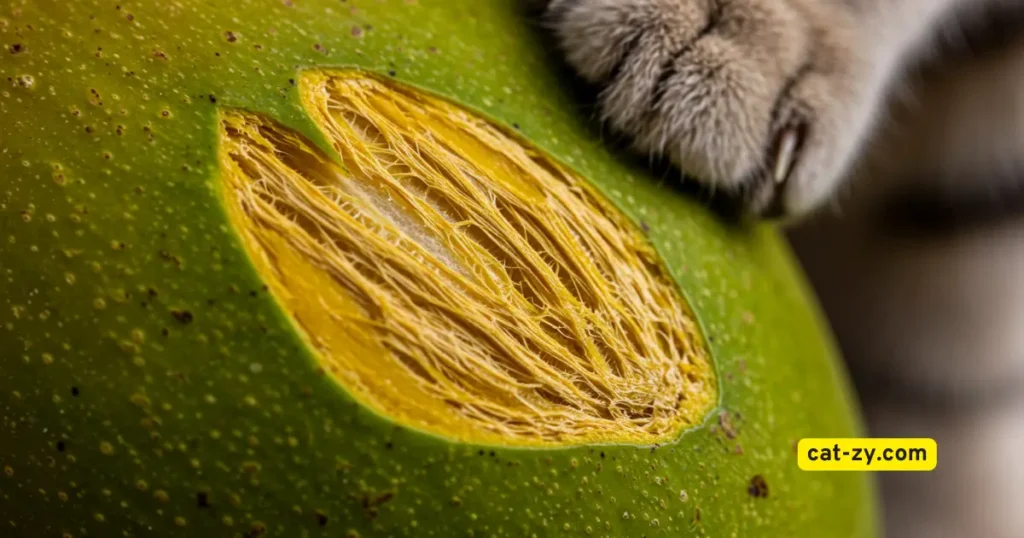
The Texture and Digestibility Issues
Mango skin is hard and fibrous. Cats can’t easily digest this. They’re not built to handle a lot of plant material.
Difficulty in Breaking Down Plant Material
Eating mango skin can upset a cat’s stomach. They might vomit or have diarrhea. This is because their digestive system can’t handle it well.
Potential Pesticide Exposure
Mango skins might have pesticide residues. These chemicals can harm cats if they eat them.
Conventional vs. Organic Mangoes
Opting for organic mangoes lowers pesticide risk. Organic farming doesn’t use synthetic pesticides. This makes the fruit and skin safer for cats.
Allergenic Properties of Mango Skin
Mango skin has urushiol, which can cause allergies in cats. Not all cats will react, but it’s a risk.
Urushiol Content and Reactions
Urushiol can irritate skin and cause allergic reactions. If your cat eats mango skin and shows signs of an allergy, like itching or swelling, see a vet.
Can Cats Eat Dried Mango? Important Distinctions
Mango’s form greatly affects its safety for cats. Fresh mango is usually okay in small amounts. But dried mango has different concerns.
The Concentration of Sugars in Dried Fruit
Dried mango has more sugars than fresh mango. When water is extracted through dehydration, the result is a more concentrated and sugar-rich fruit.
Comparing Fresh vs. Dried Sugar Content
Fresh mango has sugars, but it also has fiber and water. This balances its sugar. Dried mango, on the other hand, has more sugar in a smaller amount. For example, fresh mango has about 24 grams of sugar per cup. But dried mango can have around 30 grams in just a quarter cup.
Additives and Preservatives to Watch For
It’s also important to know about additives and preservatives in dried mango.
Sulfites and Other Harmful Ingredients
Some dried mango products have sulfites to keep them looking good and lasting longer. Sulfites can harm cats and cause bad reactions.
Reading Product Labels
Always check the labels to keep your cat safe. Look for products without sulfites and with few ingredients. Choosing unsweetened and unsulphured dried mango can help avoid problems.
In summary, dried mango isn’t toxic to cats, but it’s not the best snack because of its sugar and additives. If you give dried mango to your cat, do it very sparingly and think about the ingredients first.
Is Mango Good for Cats? Weighing the Evidence
As a cat owner asking ‘Can cats eat mango?’ you might wonder if mango is good for your cat. Mangoes are not toxic to cats. But, they might not be the best choice as a regular treat.
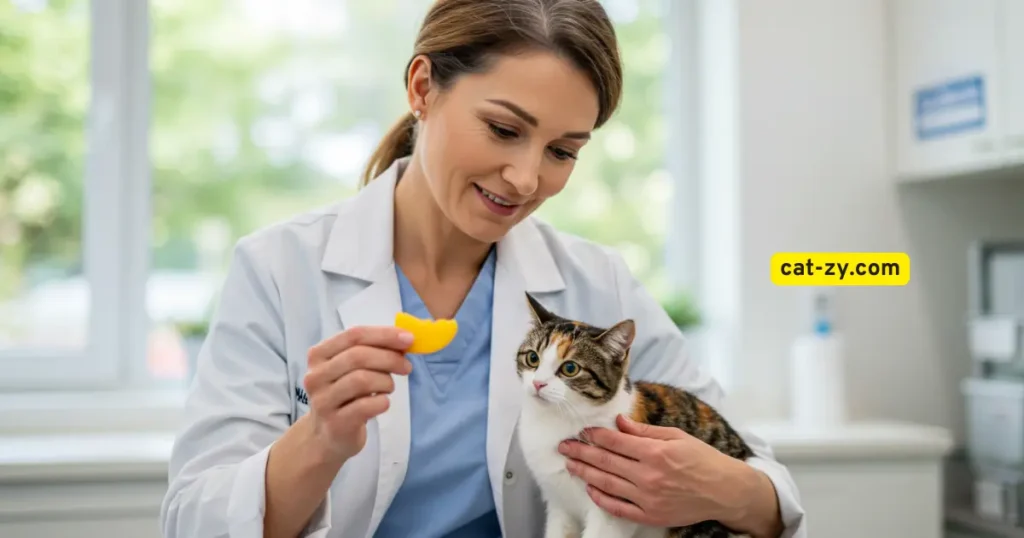
Comparing Mango to Other Cat-Safe Fruits
Mango can be compared to fruits like blueberries or bananas, which are safe for cats. But some fruits are more beneficial because of their nutrients.
Better Fruit Options for Felines
Fruits like cantaloupe and apples (without seeds) are safer and offer important vitamins and fiber. Mango, while not harmful, doesn’t have as many benefits as these fruits.
When Mango Might Be Beneficial
In some cases, mango could be a good occasional treat. This might be for cats with special dietary needs or during certain health issues. A vet might recommend it then.
Special Dietary Circumstances
For cats needing more vitamins A and C, mango can be a temporary supplement. But, this should only be done with a vet’s strict guidance.
Occasional Treat Considerations
If you’re thinking of mango as a treat, make sure it’s given in small, ripe pieces. Also, remove the skin and pit to avoid digestive problems.
How to Safely Introduce Mango to Your Cat
Before deciding whether cats can eat mango in your household, learn how to introduce it safely. Mangoes can be a tasty and healthy treat if done right.
Proper Preparation Techniques
To safely introduce mango to your cat, prepare it correctly. This means washing, peeling, and cutting it into small pieces.
Washing and Peeling
First, wash the mango well to get rid of pesticides or dirt. Then, peel the mango to avoid digestive problems from the skin.
Appropriate Cutting Methods
After peeling, cut the mango into small pieces. This helps prevent choking and makes it easier for your cat to eat.
Recommended Serving Sizes
The right amount of mango for your cat depends on their age, weight, and how well they can handle it.
Age and Weight Considerations
For young or small cats, start with a tiny amount, like a grain of rice. For larger or older cats, you can give more, but remember it’s a treat, not a meal.
Frequency Guidelines
Give mango treats once or twice a week. This helps avoid too much sugar and keeps their diet balanced.
Monitoring Your Cat After Mango Consumption
Watch your cat closely after they eat mango.
First-Time Introduction Protocol
When giving mango for the first time, watch for any bad reactions. Look for signs like vomiting, diarrhea, or feeling very tired.
Signs of Positive and Negative Reactions
A good reaction is if your cat likes the mango and eats it without problems. A bad reaction might show as allergies or intolerance, like itching, swelling, or stomach issues.
Healthier Alternatives to Mango for Cats
Mango is good for humans but not for cats. There are better choices for your cat. Many fruits and vegetables are safe and healthy for cats.
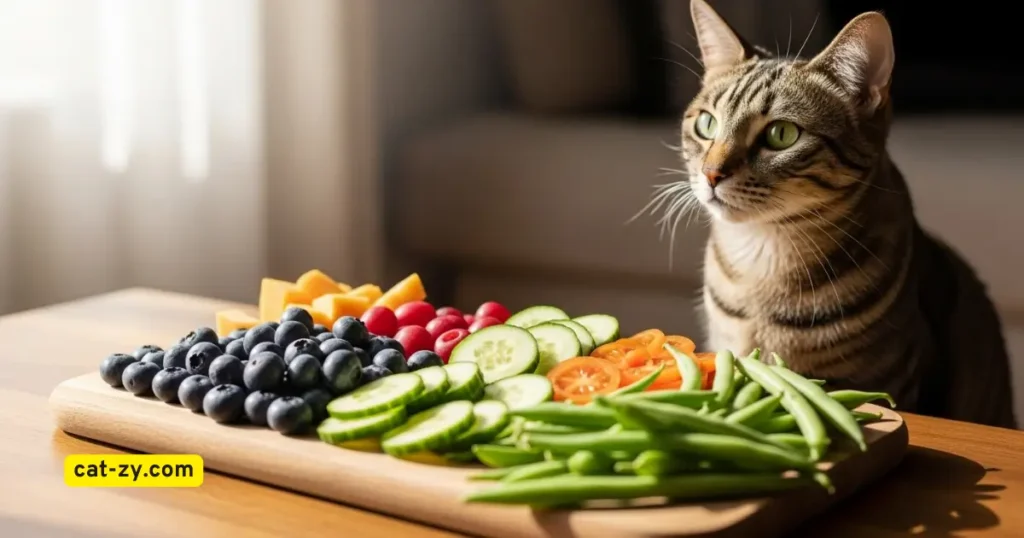
Cat-Friendly Fruits and Vegetables
Some fruits and veggies are better for cats than others. Here are a few good ones:
Safer Fruit Options
Blueberries and apples (without seeds or cores) are safe for cats. They taste good and are full of vitamins and antioxidants.
Vegetable Alternatives
Green beans and cucumbers are good for cats. They’re low in calories and easy to digest. Cats like them as a snack or with their meals.
Commercial Cat Treats with Fruit Ingredients
Commercial cat treats with fruit are a good choice. They’re made to meet a cat’s nutritional needs.
Veterinarian-Approved Options
Choose treats that are veterinarian-approved. Look for brands like Wellness and Taste of the Wild. They offer fruit-based treats.
Making Homemade Cat Treats
You can also make treats at home. Use fruits and veggies safe for cats. Always check with your vet first.
Conclusion: Making Informed Decisions About Your Cat’s Diet
As a cat owner, you might wonder if can cats eat mango. It’s safe to share mango with your cat, but only in small amounts. Mangoes aren’t toxic, but they should be given with care.
Before adding mango to your cat’s diet, think about the risks. Digestive issues or allergic reactions could happen. If you do give mango, make sure it’s cut up small and in moderation. Be careful with whether can cats eat dried mango or can cats eat mango skin, as they can be risky.
Is mango good for cats? Depends on your cat’s needs. Always talk to your vet about your cat’s diet. This way, you can keep your cat healthy and happy.
FAQ
Can cats eat mango?
Yes, cats can eat mango, but it should be in small amounts. They need to be careful.
Is mango toxic to cats?
No, mango is not toxic to cats. But the pit, skin, and too much can be harmful.
Can cats eat dried mango?
Dried mango is not toxic, but it’s not great for cats. It has too much sugar and additives.
Can cats eat mango skin?
No, it’s not good to give cats mango skin. It’s hard to digest, might have pesticides, and can cause allergies.
Is mango good for cats?
Mango can be good for cats, providing hydration and vitamin A. But it’s not the best fruit for them. The sugar is a concern.
How should I introduce mango to my cat?
Start with small, peeled, and pit-free mango pieces. Watch how your cat reacts.
What are the risks of feeding mango to cats?
Feeding mango to cats can cause digestive problems and sugar issues. There’s also a risk of choking or toxicity from the pit.
Are there healthier alternatives to mango for cats?
Yes, safer options include green beans, blueberries, or pumpkin. They’re better for cats than mango.
Is it safe for cats to eat mango?
Yes, mango is generally safe for cats in small quantities. However, it should only be given as an occasional treat, not a regular part of their diet. Always remove the skin and pit, and monitor your cat for any adverse reactions. Consult your veterinarian before introducing new foods to ensure they’re appropriate for your specific cat’s health needs.
Why does my cat love mangoes?
While cats can’t taste sweetness, they may be attracted to mango’s texture, moisture content, or unique aroma. Some cats are naturally curious about new foods and may show interest in what their owners are eating. The high water content in fresh mango might also appeal to cats who need additional hydration in their diet.
Which fruits can cats eat?
Safe fruits for cats include small amounts of blueberries, cantaloupe, seedless watermelon, and peeled apples (without cores or seeds). These should only be given as occasional treats. Always introduce new fruits gradually and remove any seeds, pits, or peels. Remember that cats are obligate carnivores and don’t require fruits for their nutritional needs.
Is mango toxic to pets?
Mango flesh is not toxic to cats or dogs, but certain parts can be dangerous. The pit contains toxic compounds and poses choking hazards, while the skin may cause digestive upset and contains allergens like urushiol. The high sugar content can also cause digestive issues if consumed in large quantities by pets.
Can mango help with cat constipation?
Mango contains dietary fiber and has high water content, which theoretically could help with mild constipation. However, cats have difficulty digesting plant fibers, and too much can cause digestive upset. It’s better to consult your veterinarian for proper constipation treatments rather than relying on fruits like mango for digestive issues.
What fruits can cats not eat?
Cats should avoid grapes, raisins, cherries, and citrus fruits, which can be toxic. Fruits with pits or seeds, like apricots, peaches, and plums, are dangerous due to choking hazards and toxic compounds. Avocado is also harmful to cats. Always research any fruit before offering it to your cat and stick to veterinarian-approved options.
What are the signs of poisoning in cats?
Signs of poisoning in cats include vomiting, diarrhea, lethargy, difficulty breathing, drooling, loss of appetite, and behavioral changes. More severe symptoms may include seizures, tremors, or collapse. If you suspect your cat has eaten something toxic like mango pits or forbidden fruits, contact your veterinarian or pet poison control hotline immediately for guidance.
Can cats have avocado?
No, cats should not eat avocado. Avocados contain persin, a compound that can be toxic to cats and cause digestive upset, breathing difficulties, and other health problems. All parts of the avocado plant, including the fruit, pit, leaves, and bark, should be kept away from cats to prevent potential poisoning.


